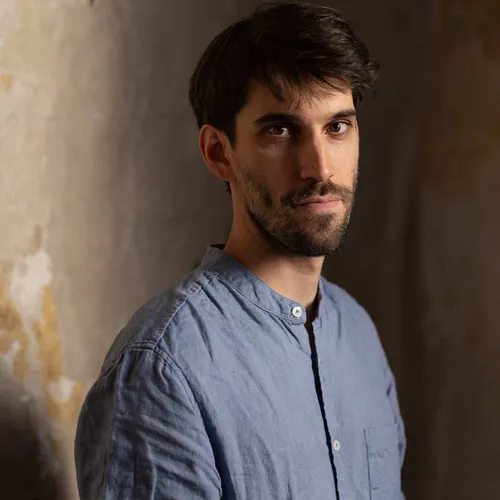
Born in Paris in 1993, Tobias Feierabend is a French-American composer based in France. Both sensitive and experimental, his music is rooted in a variety of past, present, artful and popular influences. His recent work often revisits the realm of the lullaby (Candeurs for the Quatuor Diotima, upcoming premiere in September 2025), yet also questions the notion of soundscape and the heritage of electronics and amplification (new commission from Radio France for Organ and Ondes Martenot, premiere in October 2025).
His music has received several awards and supports : he won the SACEM's Prix Hervé Dugardin in 2025, was a laureate of the Fondation Banque Populaire (2024), the Fondation de la Vocation (2023), the Fondation Vincent Meyer and the Prix Marthe Depelsenaire of the Fondation de France (2022). His works have been commissioned and performed by instrumentalists, ensembles and institutions such as Radio France, the Ensemble Intercontemporain and the Philharmonie de Paris. His scores are published by Jobert (Henry Lemoine).
As a professor of musical analysis, he has taught at the CRR de Boulogne-Billancourt until 2023 and will join the Conservatoire National Supérieur de Musique et de Danse de Paris (CNSMDP) in 2025 to teach Analysis A and B, Research Methodology and Introduction to Music History.
He holds a Master’s degree in Composition (2023) and a Master’s degree in Musicology (2017) from the CNSMDP, where he obtained 4 Prizes with highest honors in Composition, Analysis, Aesthetics and XX-XXIst-century writing. He has studied with Frédéric Durieux, Yan Maresz, Luis Naón, Grégoire Lorieux, Claude Ledoux, Jean-Luc Hervé and Valéry Aubertin. He has also participated in a variety of masterclasses conducted by prominent composers, including Tristan Murail, Unsuk Chin and Clemens Gadenstätter.
"To spin" means to tell a story, but it also means to spin, a movement found in varying degrees in Tobias Feierabend's composition. The term "spin-off" refers to a fictional serie derived from a film or from other series; it often focuses on one of the characters from the original work, revealing previously unknown elements of their past.
Tobias Feierabend is a storyteller who loves the mise en abyme and suspended narratives. In his music, "characters" are figures or sounds with a life of their own. They reappear by chance, living out new adventures as the composer opens up the gaps in his earlier pieces. Envisaged as episodes in a mini-serie, the three linked movements of Spin-off are based on works you don't need to know to listen to the new score. A deliberately naive lullaby, the first movement takes as its starting point the cello solo that opened the recent piece Music for String Quartet (2023). Conceived as a little bestiary with sometimes mischievous creatures, the second part owes most of its material to the Oiseaux gris for accordion and piano (2022), themselves inspired by Maurice Ravel's Oiseaux tristes (Feierabend confides that he "tried in every possible way to console their century-old grief"). The last movement, in which snatches of different music are recomposed", ends the story in a serious tone, before fading away in a breath. The delicacy of the last sounds is a reflection of the entire work, dominated by a certain spirit of candor, which, according to the composer's own admission, is perhaps the "true subject of the composition".
Hélène Cao (program text for the Présences Festival, 2024)